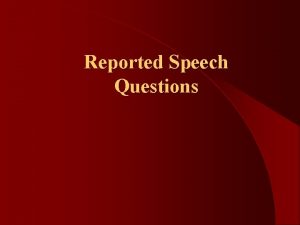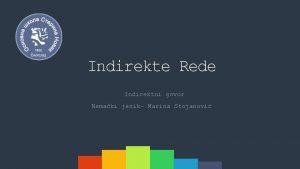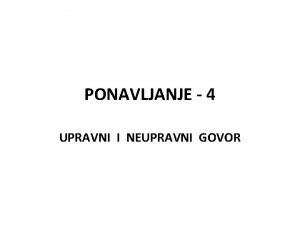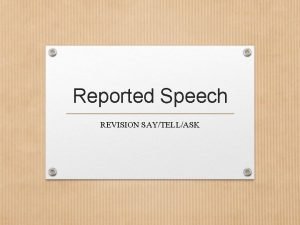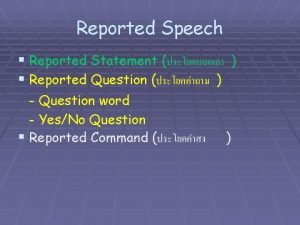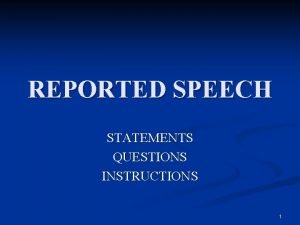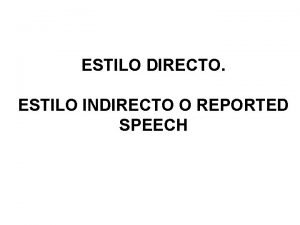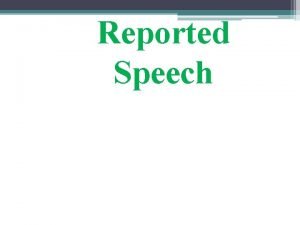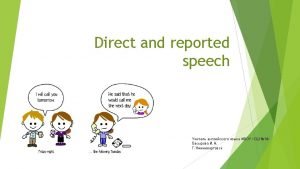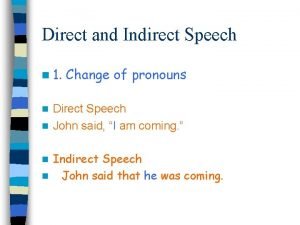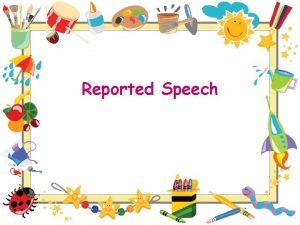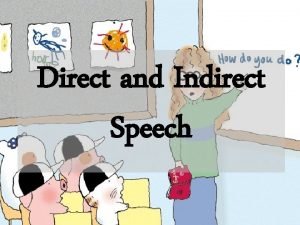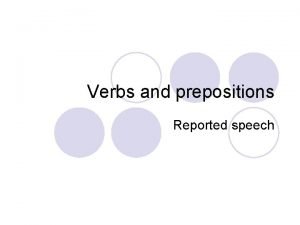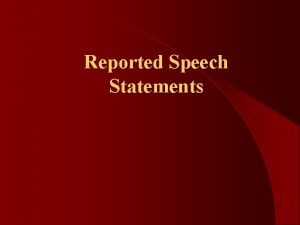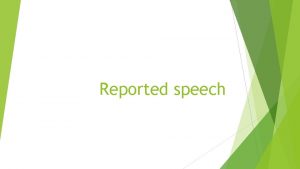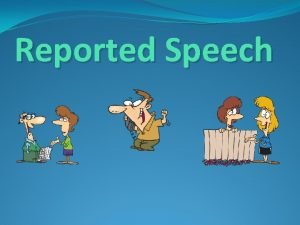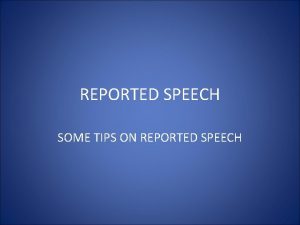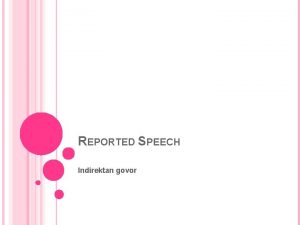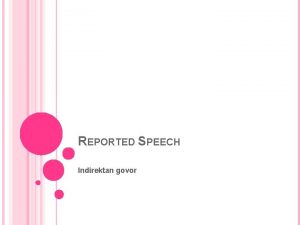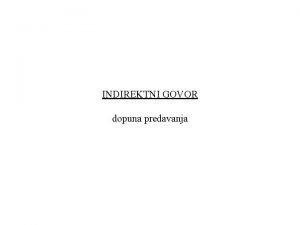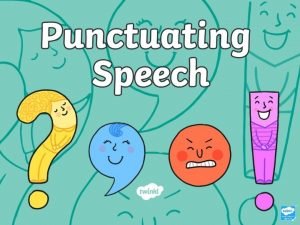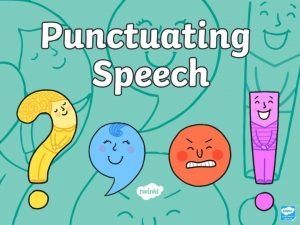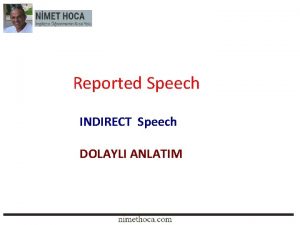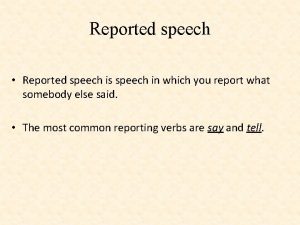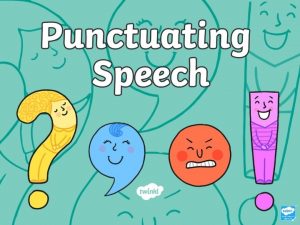Reported Speech Revision Slaganje vremena ponavljanje Indirektni govor




















- Slides: 20

Reported Speech Revision

Slaganje vremena - ponavljanje • Indirektni govor (Reported speech) nam je potreban kada prepričavamo tudje reči, tj. Prenosimo šta je neko rekao. • Za ovakav govor nam je potrebno slaganje vremena, koje nije teško ako pratimo obrazac. • Ono što je jako bitno je ne tražiti paralelu u srpskom, jer je nećemo naći, pošto u srpskom ne postoji slaganje vremena.

Izjavne rečenice - Statements Primer u srpskom: Direktni govor – Sara kaže: Ja sviram violinu. / Sara je rekla: Ja sviram violinu. Indirektni govor – Sara kaže da ona svira violinu. /Sara je rekla da ona svira violinu. Dakle, bez obzira na vreme uvodnog glagola (reporting verb), u srpskom će ostatak rečenice biti u istom vremenu, tj. ne menja se vreme u direktnom i indirektnom govoru.

Primer u engleskom: Direct speech – ”I play the violin. ” Reported speech- 1. She says she plays the violin. 2. She said she played the violin. Ako je uvodni glagol (reporting verb) kao što su say ili tell i sl. u prezentu, ništa se neće menjati, dakle glavni glagol ostaje u istom vremenu. Međutim, ako je uvodni glagol u prošlom vremenu, onda se i glavni glagol pomera jedno vreme unazad.

Pomeranje vremena Present Simple → Past Perfect Present Continuous → Past Perfect Continuous Present Perfect → Past Perfect Future Tense → Future in the Past Modal verbs: Can → could May→ might

Kada se koristi indirektni govor, moramo obratiti pažnju na odrednice za vreme i mesto koje su podložne promeni. here today tomorrow this these now yesterday last week → → → → there that day the next day/the following day that those then the day before the week before

Primeri: Present Simple → Past Simple I have a dog → She said (that) she had a dog Present Continuous → Past Continuous I am learning English → She said she was learning English Past Simple → Past Perfect I bought a flat → She said she had bought a flat

Present Perfect → Past Perfect I have been to London → She said she had been to London Past Continuous → Past Perfect Continuous I was dancing → She said she had been dancing Future Simple → Future in the Past I will travel abroad → She said she would travel abroad

Pitanja u indirektnom govoru • Kada govorimo o pitanjima u indirektnom govoru, treba razlikovati dva tipa pitanja: bez upitne reči (Yes/No questions) i sa upitnom reči (WH questions). • U oba tipa poštujemo i pratimo obrazac vraćanja vremena unazad. Ono što se razlikuje je činjenica da ne postavljamo pitanje u indirektnom govoru, pošto nam rečenica već počinje upitnim glagolom, npr. She asked me, she wanted to know… Umesto da postavljamo pitanje, treba da napravimo potvrdnu rečenicu.

To znači da ako imamo direktno pitanje ”Do you speak English? ” Nećemo reći – She asked me did you speak English, već She asked me if I spoke English. Zašto se pojavljuje IF kada ga nije bilo u direktnoj u rečenici? If se upotrebljava u slučajevima kada nema upitne reči, pa moramo da povežemo prvi i drugi deo indirektne rečenice sa DA LI, tj. sa IF ili WHETHER.

IF ili Whether? Dakle, načelno možete koristiti ili IF ili WHETHER, oba znače DA LI. Međutim, postoji izvesna razlika. Ako imamo samo jednu opciju, jedan uslov koji treba ispuniti, koristimo IF. Primer: They asked me if I had a sister. Ako imamo dve ili više mogućnosti, pravilnije je upotrebiti WHETHER. Primer: They asked me whether I had a sister or a brother. Obično se whether meša sa weather ( vreme) na šta treba obratiti pažnju.

Pitanja sa upitnom reči • Kod pitanja sa upitnom reči i dalje se držimo vraćanja jednog vremena unazad, menjamo vremenske odrednice, lične zamenice i koristimo upitnu reč iz direktnog pitanja (WHO, WHAT, WHERE, WHEN, WHY, HOW…), što znači da nam ne treba if/ whether. Primer : Direct speech- ”Where are you going tomorrow? ’‘ Indirect speech- She aked me where I was going the following day. Pošto ne pravimo pitanje, nećemo stavljati znak pitanja.

Naredbe u indirektnom govoru • Za prepričavanje nečijih naredbi koristimo glagol TELL (told) ili ORDER (ordered) i infinitive ako je o potvrdnim izjavama reč ( TO + INFINITIVE). He said to me: „Stand up!“ He told me to stand up. The policeman said to them: “Stop!“ The policeman ordered them to stop. • Ako se radi o odričnim rečenicama, koristimo takođe glagol TELL (told) ali ovog puta NOT + TO + INFINITIVE She said: „Don’t be late!“ She told me not to be late.

Zahtevi u indirektnom govoru • Za prepričavanje nečijih zahteva koristimo glagol ASK (asked) ili BEG (begged) i infinitiv ako je o potvrdnim izjavama reč (TO + INFINITIVE). He said: „Please, pass me the salt. “ He asked me to pass him the salt. She said to me: “Please, help me. “ She begged me to help her. • Ako se radi o odričnim rečenicama, koristimo takođe glagol ASK (asked) i naravno, NOT + TO + INFINITIVE. She said: „Please, don’t go!“ She asked him not to go.

Exercises: I Complete the sentences in the reported speech. 1. "I was very tired, " she said. She said that she had been very tired. 2. "Be careful, Ben, " she said. She told Ben to be careful. 3. "I will get myself a drink, " he said. He said that he would get himself a drink. 4. "Why haven't you phoned me? " he asked me. He asked me why I hadn’t phoned him. 5. "I cannot drive them home, " he said. He said that he couldn’t drive them home.

6. "Peter, do you prefer tea or coffee? " he asked. He asked Peter if he preferred tea or coffee. 7. "Where did you spend your holidays last year? " she asked me. She asked me where I had spent my holidays the year before. 8. He advised him, "Don't go too far. " He advised him not to go too far. 9. "Have you been shopping? " he asked us. He asked us if we had been shopping. 10. "Don't make so much noise, " he said. He told me not to make so much noise.

II Change the direct speech into reported speech: 1. 'I am working today’, she told us. She told us that she was working that day. 2. 'I've been ill for a couple of weeks’, he told me. He told me that he had been ill for a couple of years. 3. 'I was at the doctor’s all morning’, Peter told me that he had been at the doctor’s all morning. 4. 'I can't do it without your help’, he said. He said that he couldn’t do it without my help. 5. 'I must leave early today’, she said. She said that he had to leave early that day.

6. 'I need to see Sarah this weekend’, George told her that needed to see Sarah that weekend. 7. 'Have you signed the contract? ’, he asked. He asked if I had signed the contract. 8. 'Where did you eat? ’, he wanted to know. He wanted to know where I had eaten. 9. 'Are you going to the beach today? ’ Doris asked me if I was going to the beach that day. 10. 'Let me go!, he told them. He told them to let him go.

III Turn these sentences into reported speech 1. 'I'm going to stay with Sally tomorrow’, he said. He said that he was going to stay with Sally the following day. 2. 'Have you been here all this time? ’, father asked me. Father asked me if I had been there all that time. 3. 'You must tell Ted that I will be there’, she told her brother. She told her brother that he had to tell Ted that she would be there. 4. 'I think Jack will do something stupid’, he said. He said that he thought Jack would do something stupid. 5. 'Where were you yesterday? ’, she asked me. She asked me where I had been the day before.

6. “Do you usually cook at home? ”, she asked. She asked if I usually cooked at home. 7. “Did you arrive before seven? ”, he wanted to know. He wanted to know if I had arrived before seven. 8. “How was your holiday? ” , she inquired. She inquired how my holiday had been. 9. “Make sure you arrive early!”, he told her. He told her to make sure she arrived early. 10. “Please don’t forget my book”, he asked her. He asked her not to forget his book.
 Indirektni govor u engleskom
Indirektni govor u engleskom Indirektni govor
Indirektni govor Upravni i neupravni govor ponavljanje
Upravni i neupravni govor ponavljanje Reported speech before
Reported speech before Where were you yesterday ' he asked. (reported speech)
Where were you yesterday ' he asked. (reported speech) Passive revision
Passive revision Simple present direct speech
Simple present direct speech Direct speech into reported speech
Direct speech into reported speech Into reported speech
Into reported speech Reported speech and quoted speech
Reported speech and quoted speech Modo directo libre
Modo directo libre Look at the direct speech and complete the reported speech
Look at the direct speech and complete the reported speech They are playing football
They are playing football Direct present simple
Direct present simple Definition of optative sentence
Definition of optative sentence Direct indirect speech wh questions
Direct indirect speech wh questions Direct speech worksheets
Direct speech worksheets How many kind of sentence
How many kind of sentence Direct speech
Direct speech Reported speech already
Reported speech already Quoted speech vs reported speech
Quoted speech vs reported speech
